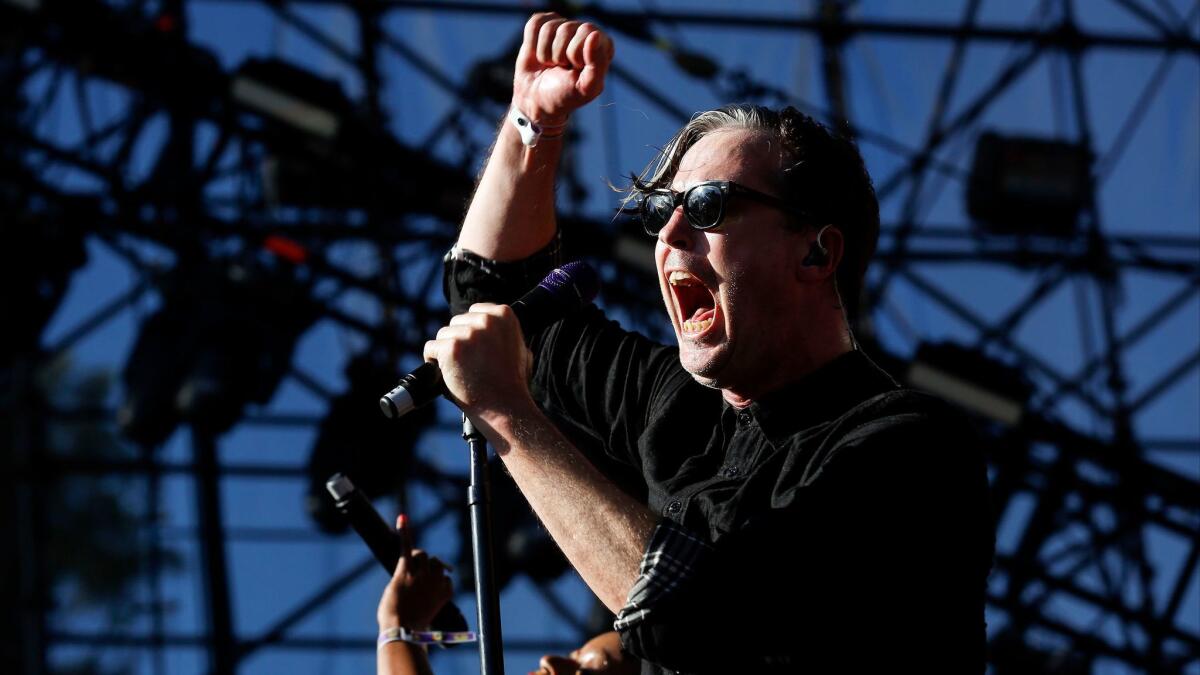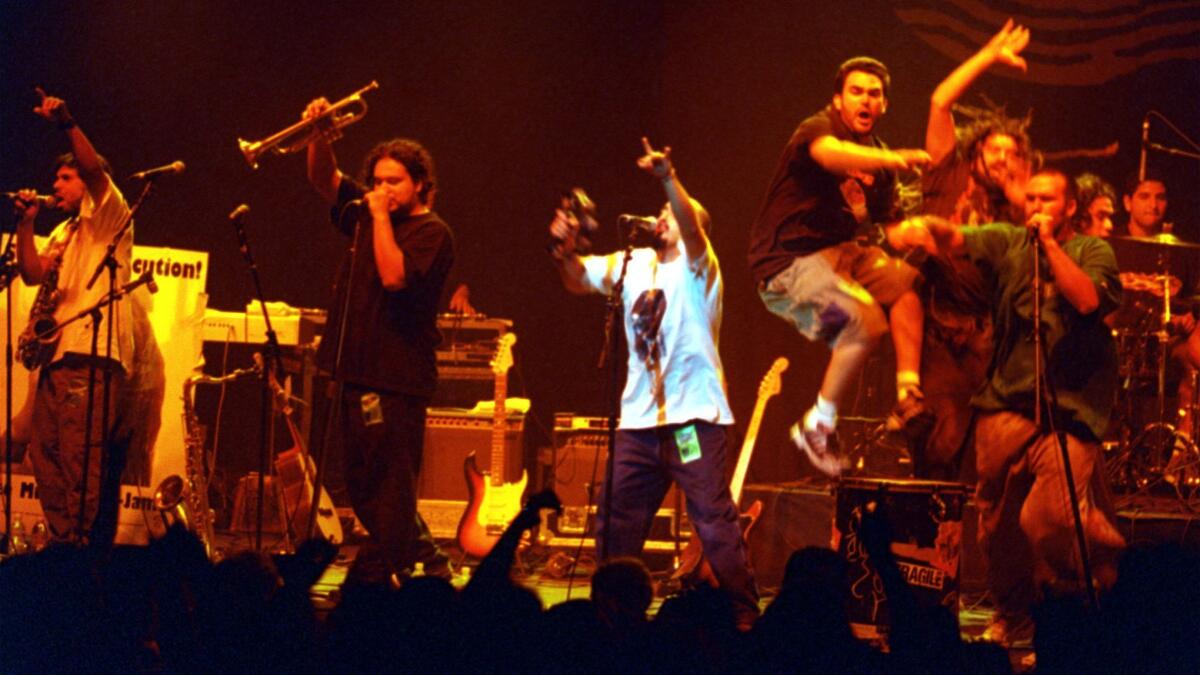Sunset Stories: Musicians ponder the power of L.A.’s musical boulevard

Next time you find yourself in a room with established musicians, ask them about their early experiences along Sunset Boulevard. Whether grizzled ‘70s rockers waxing about the Roxy, former post-punks recalling Club Lingerie or contemporary hitmakers born long after the Strip’s heyday recalling studio sessions, chances are they’ve got stories set on Sunset. Below, a few that scratch the surface.
The power of Sunset, oh boy, it’s no joke.
— Sam Martin
“In a tiny office converted into a mini-studio just off of Sunset, my buddy Jason Evigan and I — brand new writers — were beating ourselves up, struggling to write a decent idea that would impress David Guetta, who was working two rooms down the hall.
“After hours of complete failure, we finally we had a breakthrough and I ran down the hall to grab Mr. Guetta. I said, ‘If you don’t like this, then I should just quit music.’
“We played him the idea, and next thing I knew we were jumping up and down acting like cowboys riding crazy horses laughing and yelling.
“That week we wrote two No. 1 songs for him – ‘Dangerous’ and ‘Lovers on the Sun’ — in that tiny room, and I ended up featuring on both songs. The power of Sunset, oh boy, it’s no joke.”
— Sam Martin, singer and songwriter with David Guetta, the Chainsmokers, Maroon 5, Jason Derulo, One Direction and others.
It’s one of the best things when I think of L.A.: Crammed in with a bunch of friends in a tiny Honda Civic cruising down Sunset, you know?
— Arrow DeWilde
FULL COVERAGE: Mapping Sunset Boulevard’s musical history »
“This might sound kinda cheesy, but I go to the Rainbow Room all the time. It’s kind of a nostalgia thing, I guess, but also it’s just fun to go with friends and family. Last time I was there the people that work there gave me tickets to Quiet Riot.
“Every time I hear some rock song like ‘Sweet Child O’ Mine’ or something, it always reminds me of driving down Sunset at golden hour — past Highland, right when you’re getting to the Sunset Strip, listening to K-EARTH 101.
“It’s one of the best things when I think of L.A.: Crammed in with a bunch of friends in a tiny Honda Civic cruising down Sunset, you know?”
— Arrow DeWilde, singer of ascendant L.A. rock band Starcrawler.
For a kid who grew up in L.A., Sunset Boulevard has always been at the center of my musical upbringing and career.
— Michael “Fitz” Fitzpatrick, Fitz & the Tantrums
“For a kid who grew up in L.A., Sunset Boulevard has always been at the center of my musical upbringing and career. I saw so many, many bands growing up on Sunset — from the Beastie Boys at the Palladium to Beck at the Whisky.
“As a musician starting out you hadn’t earned your stripes unless you had played every club on the Sunset Strip, from the not so great early days of my musical career having to pay to play at the Whisky with my college band to my first headline gig at the Viper Room.
“Later with Fitz & the Tantrums, selling out the Palladium was a real benchmark moment for me, having gone to see so many of my heroes on that stage.
“We’ve recorded at the old Ocean Way and Sunset Sound, had our first in-store at Amoeba, rehearsed tirelessly at S.I.R. When Fitz and the Tantrums came back from tour after our first album dropped, we played east at the Echo to a crowd that knew every word to every song.
“It was in that moment that we all realized we might be on to something with this band.”
— Michael “Fitz” Fitzpatrick, Fitz & the Tantrums
The Central is where Weezer got signed out of, so that was a happening little club during the ‘90s. Johnny Depp actually bought it when it was the Central.
— Bruce Duff, bassist, writer and manager
“The Viper Room was the Central, but before that it was Filthy McNasty’s, like you see on the cover of the Sweet album. And then Filthy had the FM Station out in the Valley which was a metal club. But McNasty’s was more of a straight up rock club.
“I guess he was a local character, and he had his own all-girl backing band and he was the lead singer.
“The Central is where Weezer got signed out of, so that was a happening little club during the ‘90s. Johnny Depp actually bought it when it was the Central.”
– Bruce Duff, bassist (45 Grave, Wayne Kramer, Twisted Roots, Jesters of Destiny), writer and manager, during a cruise down Sunset.
I never played the Whisky, but I think I have paid my Viper Room dues, way way … back. That precious boulevard is a part of me and my music.
— Jonathan Wilson, songwriter and producer
“I have a song on my new album oddly enough called ‘Sunset Blvd’ and it’s simply about me driving an old sports car down Sunset all the way from Echo Park west to the ocean, which I do quite a bit late at night when the roads are clear.
“The song says, ‘Way out on that precious boulevard/ I can be weightless, timeless.’
“It’s a special road and it does invoke these feelings. Be it the curves of Bel-Air or the Strip, I have many memories of Sunset. In fact, the first J.W. solo show was on Sunset at the old Roxbury. I was playing in the pub part downstairs while Ministry played upstairs.
“I remember playing Friday nights at Mark Mahoney’s Shamrock Social Club, and some of my earliest acoustic shows were at the old Rock Coffee Shoppe opposite the Chateau. Coconut Teaszer, you name it.
“I never played the Whisky, but I think I have paid my Viper Room dues, way way … back. That precious boulevard is a part of me and my music. I’ll be driving it later tonight.”
— Jonathan Wilson, songwriter and producer for Father John Misty and Dawes
That room was bearing the historical brunt of River Phoenix’s death there, still, at least during that era.
— Uli Bella, saxophonist for Ozomatli, on the Viper Room
“The Viper Room had its own mystique to it, but the layout of the club wasn’t that nice. As far as a dressing room, there was one but it was really tiny – like this little cocaine room.
“I remember that to get the gear off the stage, you always had to throw it out right onto Sunset. Basically it was your whole … life on Sunset, and there would always be that drama – ‘Who’s going to stand and watch it?’

“But that room was bearing the historical brunt of River Phoenix’s death there, still, at least during that era.
“I was playing both in [ska band] Yeska and in Ozomatli, and both of the bands would play. That’s actually one of the places where Ozomatli started the whole idea of doing the samba in and out.
“There was this rivalry among the bands – even though I was in both bands – about who could … it up harder onstage. So that was one of the places where we were like, ‘We’re going to march in with samba drums!’
“Sometimes Johnny Depp would be there. It was a trip. We were just … kids, you know?” – Uli Bella, saxophonist for Ozomatli.
After the show, once everyone went home, Hannah [Hooper] and I sat out front of the venue on Sunset Blvd, drinking super late and just took it all in.
— Christian Zucconi
We played our first show ever at El Cid in 2010. Our previous projects had maybe fifteen people show up to see us play, so when we heard we sold out El Cid we got stuck in a nervous disbelief.
We played our-hour long set super fast and finished with something like 25 minutes to spare. After the show, once everyone went home, Hannah [Hooper] and I sat out front of the venue on Sunset Blvd, drinking super late and just took it all in.
-- Christian Zucconi, Grouplove
For tips, records, snapshots and stories on Los Angeles music culture, follow Randall Roberts on Twitter and Instagram: @liledit. Email: [email protected].
UPDATES:
10:23 a.m.: This article was updated with quotes on Sunset Blvd. from Bruce Duff and Uli Bella.
This article was originally published at 9 a.m.
More to Read
The biggest entertainment stories
Get our big stories about Hollywood, film, television, music, arts, culture and more right in your inbox as soon as they publish.
You may occasionally receive promotional content from the Los Angeles Times.









